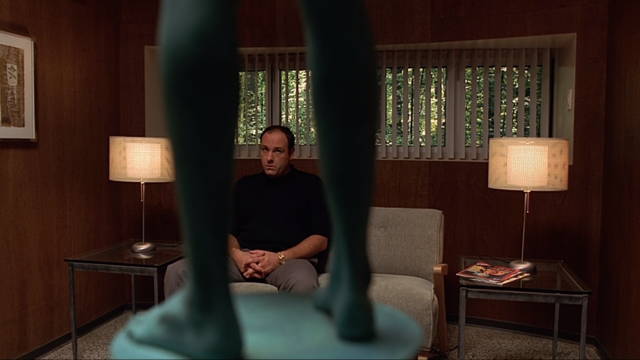The thing I like most about The Sopranos is that its influences are both obvious and very well-digested. I’ve never heard anyone complain that it’s just a ripoff of Goodfellas or Dostoevsky the way I’ve heard people complain that, say, Pacific Rim is a ripoff of Neon Genesis Evangelion despite both claims being equally ridiculous*. Admittedly, this is partly because a group of anime fans contains more dumbasses than a group of people who’ve read Dostoevsky (the only actual similarities between Pacific Rim and NGE is that both contain people piloting giant robots to fight aliens in cities), but it’s also because The Sopranos uses its influences to achieve specific goals distinct from what its predecessors were trying to achieve. What compels me to study the show in further depth is how each thing it takes from what came before serves a particular purpose and helps synthesise individual elements into a complete whole, the way a cake synthesises flour and eggs and stuff. I’d say the three most important pop culture ascendants to The Sopranos are the books of Fyodor Dostoevsky, the movie Goodfellas, and the films of David Lynch.
*While writing this essay, I saw someone (jokingly?) complain The Sopranos was a ripoff of Goodfellas.
The Dostoevsky is one of the most crucial aspects. Reading Notes From Underground was an ‘aha!’ moment for me, in which many of the assumptions about human nature the show worked under were laid out bare for me. Dostoevsky provided The Sopranos with philosophy. The narration of NFU puts into words the underlying attitude of the show’s worldview – the circling around of ideas, the observations of human behaviour, and most of all the all-encompassing contempt for everyone and everything. What NFU conveys through prose, The Sopranos conveys cinematically. The neuroticism of its nameless protagonist is also strongly evident in antihero Tony – the cycles of doubt and self-destructive behaviour that Tony goes through are very reminiscent of the path of the narrator.
The Goodfellas influence is present in the aesthetic, which includes the action. It isn’t just that they do and have things from the movie – beating up people for protection money, eating lavish meals, pulling off insurance scams, living and working in massive houses, gambling illegally – it’s that everything else they do makes sense as something Henry Hill would do or see. Dostoevsky gave the show motivation, but Goodfellas gave it a way of expressing that motivation. The choice of image does inform the themes – it’s how it talks about the Italian-American experience as well as the decline of the American Dream – but it’s also present simply because it’s beautiful and cool. One could imagine a version of The Sopranos that’s exactly the same thematically but riffs on the imagery of, say, cowboy movies. David Lynch’s influence is very close to aesthetic and action, but it refers to actions that the storyteller chooses that the characters aren’t aware of – the technique. When working in a particular medium, it usually behooves one to lift techniques that worked from one who has come before. Chase was deeply influenced by Twin Peaks; the use of colour and the use of silence particularly. Most dramatic was the use of dream sequences, which were in part an extension of the dreamlike quality of the show on a day-to-day level.
Dividing up the influences like this isn’t just fun in a trainspotting kind of way. One thing it’s useful for is quantifying what one wants to lift for one’s own work – almost every work of fiction I write these days lifts technique from The Shield and (in a roundabout way) James Ellroy, and I usually look elsewhere for aesthetic to steal. It also makes it easier to spot what is actually original about a work. In writing this, it occurred to me that 8 Bit Theater contains truly original technique – not just in the sense that it was nearly one of the first comics to use sprites from old video games for art and not just in its sprawling nine-panel structure for individual strips, but in how it finds gaps to fill in creatively, including the ways it fills in the background. The only things that look like 8 Bit Theater are things ripping off 8 Bit Theater. Meanwhile, Mad Men feels wildly creative and original, but that’s entirely down to the characterisation and philosophy the characters espouse; there’s no image or action within it that wasn’t lifted from somewhere else, and in fact this is one of the minor joys of the series, as it finds the most appropriate image for the characters. With The Sopranos, its true original creation is the feeling of Catholic depression. I can imagine an alternate version of the show that swapped out the techniques of Twin Peaks for those of Miami Vice, the aesthetic of Goodfellas for that of ER, and the philosophy of Dostoevsky for that of Michael Moorcock. But take away the sense of sin compounding upon itself until reality threatens to break underneath it and you don’t have The Sopranos anymore.

